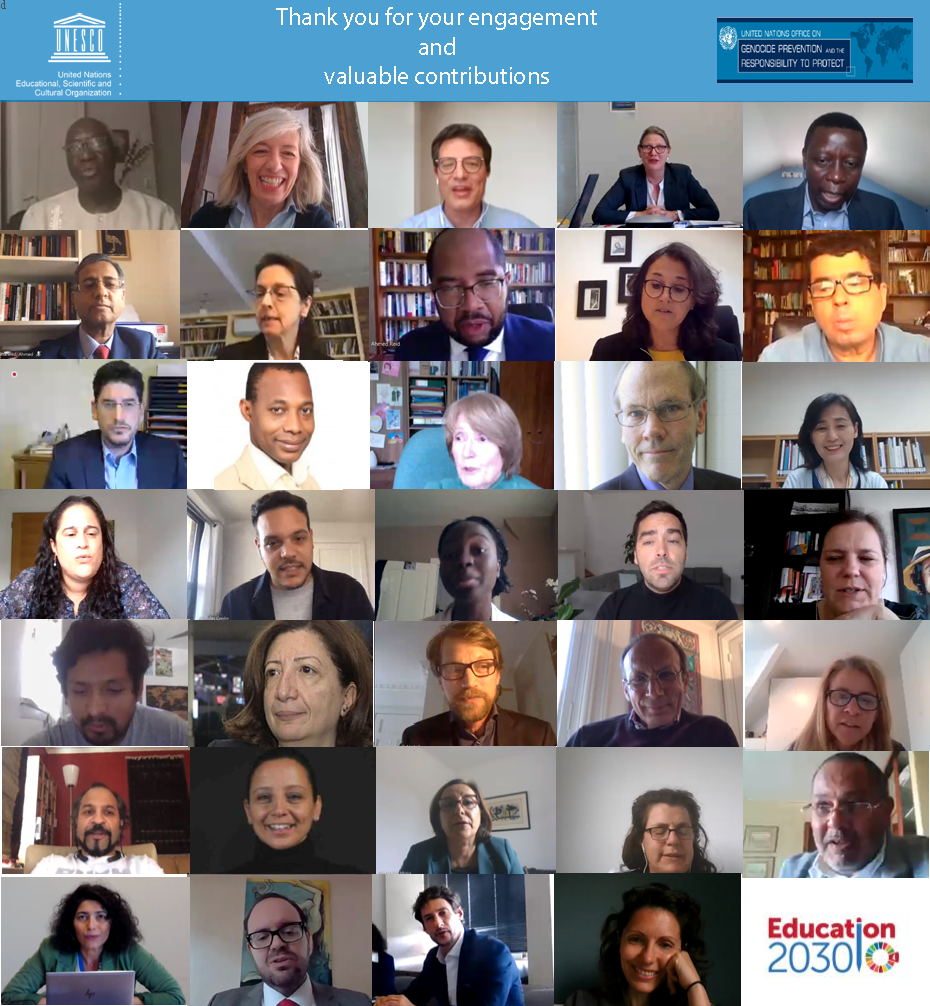Executive Director Ana Perona-Fjeldstad participated at a virtual UNESCO expert meeting on “Education as a Tool for Prevention: Addressing and Countering Hate Speech” May 13-14. 2020. At the meeting experts discussed recommendations ahead of the upcoming Global Education Ministers Conference and Multi-stakeholder Forum on addressing and countering hate speech through education.

The virtual experts’ meeting was organized by UNESCO and the United Nations Office on the Prevention of Genocide and the Responsibility to Protect (OSAPG), bringing together more than 20 world renowned experts, including youth representatives, human rights experts and education specialists, to review existing evidence on addressing and countering hate speech, exchange good practices and develop a strategy to boost member states’ capacity to address the phenomenon on and offline through education.
The virtual meeting responds to the UN Secretary General’s United Nations Strategy and Plan of Action on Hate Speech and was organized in preparation for the Global Education Ministers Conference and Multi-stakeholder Forum on addressing and countering hate speech through education (date and venue to be confirmed).
Based on EWC experiences, Perona-Fjeldstad highlighted the need to further discussions on:
- Strengthening the competences of educators to support students dealing with difficult controversial issues
- When promoting a multi-stakeholder approach to address hate speech, need to focus more on Home-School cooperation
As to the first point on strengthening the competences of educators, Perona-Fjeldstad noted that formal education has a crucial role in preparing young people to learn to live together in complex diverse societies. She stressed that education professionals need to be properly equipped to deal with difficult issues which are polarizing entire societies and threatening our democracies:
“Many of these controversial issues discussed on media, social media, the neighbourhood piazza and kitchen tables, are also entering our classrooms and schools’ yards. In our experience, many of these are issues educators were not prepared to deal with at university. At the moment, educators experience that dealing with controversial issues is a very hard job: there is the feeling of the lack of knowledge as well as lack of self-confidence in their own ability to deal with them in the classroom, while creating a safe space for discussion. Students should learn to explore each other’s views, agree to disagree, open up new perspectives to live and understand the value of diversity and inclusion. There are pedagogies and concrete tools available which are very sought after in our experience, but the need for building capacity is still massive”
Perona-Fjeldstad also stressed the need of increasing educators’ competences to support children to navigate the digital world:
“Work done at the Council of Europe reveals a lack of awareness among educators of the importance of developing digital citizenship competences for the well-being of young people. Young people are growing up in a highly digitalized world. Well-being is built to a large degree on how children perceive themselves though the eyes of others, hence on the interaction with others. Technology is shaping a good part of their social interaction, at times in positive ways, but often also in negative ways, impacting their lives. Educators should empower young people to effectively understand and navigate the online world: developing empathy, critical thinking skills, listening skills and communication skills for positive online interaction; understanding what it is and how to deal with cyber bullying; managing their own online identity in a safe way, learning on socio-emotional health issues. It is a long list, and not many teachers have learnt how to deal with this at their pre-service training.”
Perona-Fjeldstad went on to point out the importance of multi-stakeholder cooperation to address hate speech and the need to focus on home-school cooperation
“We all agree that to address hate speech there is a need to have a multi-stakeholder approach, building partnerships. A very important component is cooperation between the homes and the schools. This is often a complex task in many countries, but we know that many prejudices and stereotypes against certain groups come from home and local communities. Schools need to build strong partnerships with parents in order to raise awareness around hate speech, fake news, conspiracy theories and disinformation, and how this is affecting our societies.”
“After working for many years with development of democratic competences through the whole school approach, EWC sees that in order to educate children for responsible citizenship, democratic practices need to be in place in all areas of school life – both curriculum, teaching and learning, governance, and not least cooperation with parents. If we are to succeed, we ought to work together”.